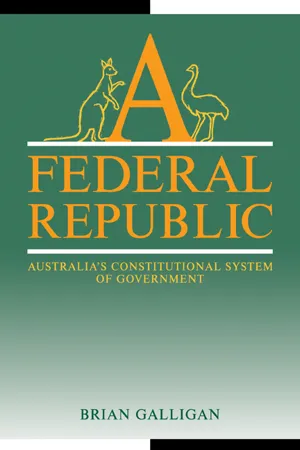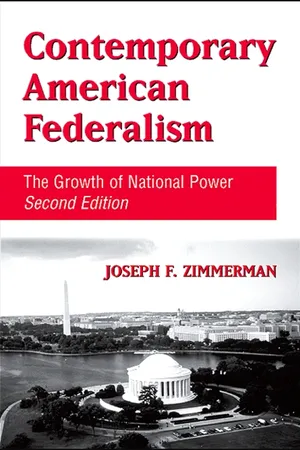Politics & International Relations
Concurrent Powers
Concurrent powers refer to the powers that are shared by both the federal and state governments in the United States. These powers include the ability to tax, regulate commerce, and establish courts. The concept of concurrent powers is a key aspect of the federal system of government in the US.
Written by Perlego with AI-assistance
Related key terms
1 of 5
3 Key excerpts on "Concurrent Powers"
- eBook - PDF
- Paul R. Williams(Author)
- 2021(Publication Date)
- Cambridge University Press(Publisher)
48 Implementing concurrent authorities can lead to substantial discord between the levels of government. As a result, states generally establish mechanisms for dispute resolution and cooperation between levels of government in the exercise of concur- rent authorities, such as a review process by a constitutional court. Further, execut- ing concurrent authorities can prove to be complicated if deliberate guidance is not included in an agreement or constitution. States may also establish “residual clauses” by which any authorities that are not explicitly designated are retained by either the national or local governments. For instance, the German Constitution reserved authority over areas that are the pre- rogative of a sovereign state, such as foreign affairs and defense, national citizenship, customs and trading, and currency for the national government. 49 All authorities not vested in the national government through the constitution are granted to Germany’s provinces. 50 Conversely, in Canada, residual powers are reserved for the national government. 51 This can in many instances be one of the most important clauses when addressing the allocation of legislative and executive powers. Political, Administrative, and Fiscal Decentralization In the context of devolution, there are generally three categories of devolved powers: political, administrative, and fiscal. Political Decentralization Political decentralization involves the devolution of governing responsibilities and decision-making authority to substate entities. These powers are devolved to local executive and parliamentary bodies, which may be elected by the population of the substate entity. These local bodies are then empowered to decide on policies, rules, and regulations regarding the issues that have been assigned to the substate entity in the peace agreement and/or constitution. The purpose of political decentralization is to bring decision-making closer to the people affected by those decisions. - eBook - PDF
A Federal Republic
Australia's Constitutional System of Government
- Brian Galligan(Author)
- 1995(Publication Date)
- Cambridge University Press(Publisher)
The concurrency approach can be extended to that other area of potentially enormous expansion of Commonwealth power, the section 51 (xxix) external affairs power. The minority judges in the Tasmanian Dam case (198S) rejected the open-ended interpretation of the majority but could not find a principled constitutional basis on which to base their decision, other than appealing to federal ‘balance’. The majority judges’ view is consistent with the pervasive concurrent structure of the Constitution, even though they based it, implausibly, on the doctrinal appeal of the Engineers ’interpretive method, as we saw in chapter 7. To reiterate, the consequence of concurrency is to allow involvement of both spheres of government in a particular field with the sorting out of particular roles left to continuing political and administrative processes of intergovernmental relations, with eventual Commonwealth para- mountcy assured. The policy consequences of having a concurrent rather than a coordi nate division of powers are profound and would need extensive elabora tion in a treatise on intergovernmental relations. In a book on the constitutional system there is space only for a brief survey of the type of intergovernmental relations regime that a concurrent division of powers entails. Because concurrency involves shared jurisdictions, overlap and dupli cation, far from being deviations or anomalous accretions, are grounded in the underlying constitutional system. That does not mean that governments need to be bumping into one another all the time or dupli cating one another’s policies and public services. But they do need to take account of what the other is doing and should pay attention to the impact of their actions on the other level of government. Obviously, there needs to be an adequate system of intergovernmental arrange ments and procedures for coordinating policy action when that is required or achieving agreement on national standards. - eBook - PDF
Contemporary American Federalism
The Growth of National Power, Second Edition
- Joseph F. Zimmerman(Author)
- 2008(Publication Date)
- SUNY Press(Publisher)
In practice, how- ever, the attempt to implement a modified federal system within a state has been hindered in several states by court decisions as explained in chapter 8. Concurrent Powers The delegation of specific powers to Congress by the national constitution does not necessarily prevent states from exercising the same powers since not all powers delegated to Congress are exclusive in nature. These Concurrent Powers include levying taxing, borrowing money, establishing courts, and constructing highways. Relative to taxation, Congress and state legislatures both impose levies on corporate and personal income, alcoholic beverages, petroleum products, and cigarettes and other tobacco products. A state may exercise the police power in a field delegated to Congress if the latter has failed to legislate in that field or if the national law is inad- equate to protect public health and safety. In the absence of a national law, the judicial function extends only to an inquiry relative to whether the state in enacting a law took action within its province and whether the reg- ulations are reasonable. If Congress decides to assume total responsibility for a regulatory function within its sphere of powers, the supremacy of the law clause of the U.S. Constitution (Article VI) automatically nullifies all major state The United States Constitution 37 constitutional provisions and statutes if a judicial challenge is brought. In effect, the supremacy of the laws clause makes Congress the judge of the extent of its powers subject to a judicial challenge. Bankruptcies, for exam- ple, were regulated primarily by states until 1898 when Congress assumed complete responsibility for the function and all state bankruptcy laws except the homestead provision immediately were nullified. 6 The ability of Con- gress to assume partial or complete regulatory in various fields automatically produces continuing changes in national-state relations as described in greater detail in chapter 4.
Index pages curate the most relevant extracts from our library of academic textbooks. They’ve been created using an in-house natural language model (NLM), each adding context and meaning to key research topics.


